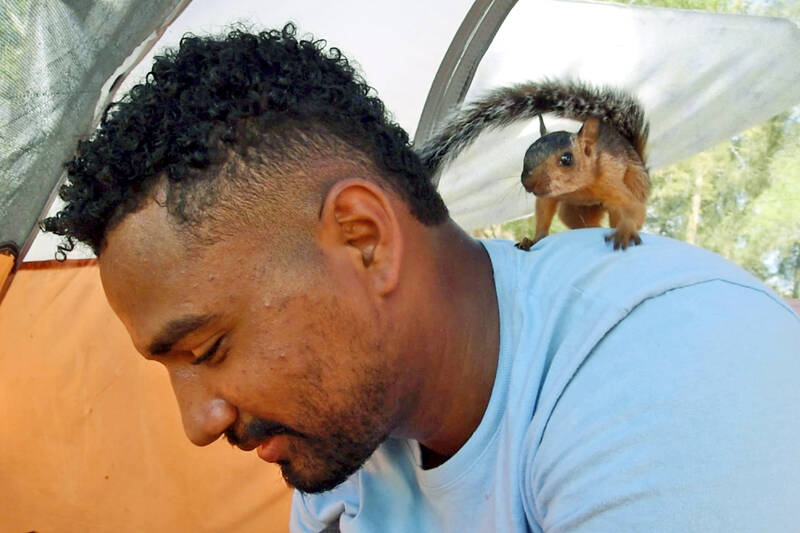During the weeks it took Yeison and Niko to migrate from Venezuela toward the US, they navigated dangerous jungles and over a dead body. The two are so inseparable that Yeison sold his phone so both had enough bus money to continue their journey.
Now as Yeison prepares to finally enter the US, it is likely he would have to leave Niko behind. That is because Niko is a squirrel.
The 23-year-old man and his pet squirrel are an unusual but blunt reflection of the emotional choices migrants make over what to take — and what to leave behind — as they embark on the dangerous trip north.

Photo: AP
Yeison, who declined to give his last name out of fear for his family’s safety in Venezuela, said that going without Niko was out of the question, but Mexico is where they might be forced to part ways.
Yeison, who is among millions of Venezuelans fleeing political and economic unrest back home, secured an appointment for yesterday to present himself at the border to seek entry to the US and request asylum. Animals are generally not allowed to cross the border.
“It would practically be like starting with nothing, without Niko,” Yeison said.
Many who set off on the about 4,800km journey to the US do so with only what they can carry and their loved ones. For Yeison, that was a squirrel with a black stripe and flecks of white hair, who made the long trip nesting in a red knit cap stuffed inside a backpack.
For six months, Yeison and Niko lived in a tent at an encampment with hundreds of other migrants in Matamoros. The site is across from Brownsville, Texas, which is hundreds of miles east of Eagle Pass and not experiencing the same dramatic increase in migrants that prompted the mayor to issue an emergency declaration this past week.
On a recent day, Niko crawled over Yeison’s shoulders and stayed close while darting around the tent. Chances were slim that Yeison could take Niko across the border, but volunteers at the encampment were not giving up.
Gladys Canas, director of non-governmental organization Ayudandoles A Triunfar, said that she has encountered other migrants who wanted to cross with their pets — cats, dogs and even a rabbit once, but until now, never a squirrel.
Canas helped connect Yeison with a veterinarian to document Niko’s vaccinations to provide to border agents.
She said she is hopeful they would allow the squirrel to cross, whether with Yeison or with a volunteer.
“There’s a connection between him and the squirrel, so much that he preferred to bring it with him than leave the squirrel behind with family in Venezuela and face the dangers that come with the migrant journey. They gave each other courage,” she said.
Yeison said that he found the squirrel after nearly stepping on him one day in Venezuela. The squirrel appeared to be newly born and Yeison took him home, where he named him Niko and family members fed him yogurt.
The picky squirrel prefers nibbling on pine trees and is fed tomatoes and mangoes, even when food is hard to come by, Yeison said.
At first, he sought work in Colombia, but returned to find a loose pine splinter lodged in Niko’s eye and resolved after that to take the squirrel with him on the next journey to the US, he said.
Like thousands of migrants, Yeison made the trip through the perilous jungle known as the Darien Gap, where he said he found the body of a man under some blankets.
He said that he concealed Niko in a backpack when they boarded buses and crossed through checkpoint inspections in Mexico, but one time, a bus driver discovered the squirrel and made him pay extra to keep the animal on board.
Yeison said that he sold his phone for US$35 to cover the cost.
Once they reached the encampment in Matamoros, the pair settled into a routine. Yeison makes money cutting hair by his tent and often falls asleep sharing the same pillow with Niko at night.
He was bracing for a separation.
“I don’t want for him to be separated from me, because I know that we’d get heartsick. I’m sure of that,” he said. “And if he doesn’t get sick, I hope he gets to be happy, and that he never forgets my face.”

ANGER: A video shared online showed residents in a neighborhood confronting the national security minister, attempting to drag her toward floodwaters Argentina’s port city of Bahia Blanca has been “destroyed” after being pummeled by a year’s worth of rain in a matter of hours, killing 13 and driving hundreds from their homes, authorities said on Saturday. Two young girls — reportedly aged four and one — were missing after possibly being swept away by floodwaters in the wake of Friday’s storm. The deluge left hospital rooms underwater, turned neighborhoods into islands and cut electricity to swaths of the city. Argentine Minister of National Security Patricia Bullrich said Bahia Blanca was “destroyed.” The death toll rose to 13 on Saturday, up from 10 on Friday, authorities

DEBT BREAK: Friedrich Merz has vowed to do ‘whatever it takes’ to free up more money for defense and infrastructure at a time of growing geopolitical uncertainty Germany’s likely next leader Friedrich Merz was set yesterday to defend his unprecedented plans to massively ramp up defense and infrastructure spending in the Bundestag as lawmakers begin debating the proposals. Merz unveiled the plans last week, vowing his center-right Christian Democratic Union (CDU)/Christian Social Union (CSU) bloc and the center-left Social Democratic Party (SPD) — in talks to form a coalition after last month’s elections — would quickly push them through before the end of the current legislature. Fraying Europe-US ties under US President Donald Trump have fueled calls for Germany, long dependent on the US security umbrella, to quickly

Local officials from Russia’s ruling party have caused controversy by presenting mothers of soldiers killed in Ukraine with gifts of meat grinders, an appliance widely used to describe Russia’s brutal tactics on the front line. The United Russia party in the northern Murmansk region posted photographs on social media showing officials smiling as they visited bereaved mothers with gifts of flowers and boxed meat grinders for International Women’s Day on Saturday, which is widely celebrated in Russia. The post included a message thanking the “dear moms” for their “strength of spirit and the love you put into bringing up your sons.” It

In front of a secluded temple in southwestern China, Duan Ruru skillfully executes a series of chops and strikes, practicing kung fu techniques she has spent a decade mastering. Chinese martial arts have long been considered a male-dominated sphere, but a cohort of Generation Z women like Duan is challenging that assumption and generating publicity for their particular school of kung fu. “Since I was little, I’ve had a love for martial arts... I thought that girls learning martial arts was super swaggy,” Duan, 23, said. The ancient Emei school where she trains in the mountains of China’s Sichuan Province